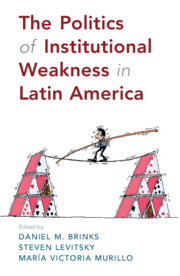Book contents
- The Politics of Institutional Weakness in Latin America
- The Politics of Institutional Weakness in Latin America
- Copyright page
- Contents
- Figures
- Maps
- Tables
- Contributors
- Acknowledgments
- 1 The Political Origins of Institutional Weakness
- 2 When (Electoral) Opportunity Knocks
- 3 The Stickiness of “Bad” Institutions
- 4 Presidential Crises in Latin America
- 5 Coercion Gaps
- 6 Aspirational Laws as Weak Institutions
- 7 The Social Determinants of Enforcement
- 8 A Multilevel Approach to Enforcement
- 9 What/Whose Property Rights?
- 10 Imported Institutions
- 11 Social Origins of Institutional Strength
- 12 Conclusion
- Bibliography
- Index
5 - Coercion Gaps
Published online by Cambridge University Press: 06 May 2020
- The Politics of Institutional Weakness in Latin America
- The Politics of Institutional Weakness in Latin America
- Copyright page
- Contents
- Figures
- Maps
- Tables
- Contributors
- Acknowledgments
- 1 The Political Origins of Institutional Weakness
- 2 When (Electoral) Opportunity Knocks
- 3 The Stickiness of “Bad” Institutions
- 4 Presidential Crises in Latin America
- 5 Coercion Gaps
- 6 Aspirational Laws as Weak Institutions
- 7 The Social Determinants of Enforcement
- 8 A Multilevel Approach to Enforcement
- 9 What/Whose Property Rights?
- 10 Imported Institutions
- 11 Social Origins of Institutional Strength
- 12 Conclusion
- Bibliography
- Index
Summary
Institutions that require the use of coercion to enforce create political headaches. In these settings, enforcement involves fines, jail sentences, and asset seizures that are unpopular with those affected. This chapter highlights how coercive sanctions can generate social and electoral reactions against institutions, even when there is broad support for the underlying institutional aims. Intentional decisions not to enforce the law, or what I call forbearance (Holland 2016, 2017), is an important source of the institutional weakness studied in this volume.
Applying coercive sanctions is a challenge in any democracy. But in highly unequal societies, such as those in Latin America, enforcement challenges are compounded by both the power and poverty of those affected by institutional rules. On the one hand, the wealthy often stand above the law, using their money and connections to bend formal rules in their favor and forgo sanctions.
- Type
- Chapter
- Information
- The Politics of Institutional Weakness in Latin America , pp. 119 - 140Publisher: Cambridge University PressPrint publication year: 2020
- 2
- Cited by

